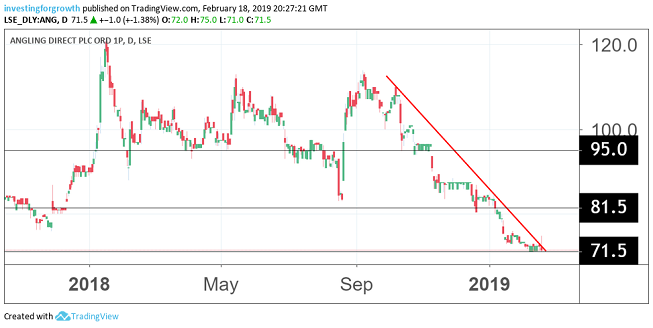Stockwatch: An AIM share near a record low
He previously warned about this niche retailer, but our stock picker now thinks they're worth a nibble.
19th February 2019 09:26
by Edmond Jackson from interactive investor
He previously warned about this niche retailer, but our stock picker now thinks they're worth a nibble.

As investors review portfolios with Brexit coming to a head this month and next, what guidance is it reasonable to expect from companies as to measures they are taking to cope with the various scenarios?
Emphasis to date has included opening continental European subsidiaries (quite whether this would guarantee against export tariffs for UK domiciled firms is unclear) and, more recently, stock-piling to avert supply issues. The crux question I see is whether such subsidiaries end up as part of the EU single market, or as arms of British corporate bodies.
Meanwhile, it is vague whether some companies emphasising growth in Europe can avoid tariffs at all in the event of a Hard Brexit from 29 March (or possibly end-June, lest Mrs May fruitlessly buys further time then capitulates to not splitting the Tory party).
European marketing based on websites
One example is a latest trading update from AIM-listed Angling Direct (LSE:ANG) which is the UK's largest specialist fishing tackle retailer. For its latest financial year to end-January, revenues are up 39% to £42 million, partly helped by international sales up 98% to £4.7 million or 21% of online sales. An ability to leverage international sales online is a key element for this stock to evolve seriously from a £47 million market value and a current share price of around 73p.

Source: TradingView (*) Past performance is not a guide to future performance
While shipments end up in 49 different countries, the emphasis appears on Europe - "significant progress was supported by the launch of the group's German website in June 2018, and Netherlands and French websites which went live towards the end of the year." As yet, contributions are modest: Germany is the biggest international market, albeit only 3.6% of online sales, with Russia at 3.5% and France 2.1%.
Yet pursuing new markets is wise now that there are big – and price-conscious – suppliers of fishing tackle in the UK such as Sports Direct (LSE:SPD) and global retailer Decathlon. We've yet to see how Angling Direct can fare in a domestic recession.
Updates need to explain more than stock management
Here's the crux, which is relevant to all shares in exporting companies:
Management says the business "has been structured in preparation for Brexit," yet this appears solely in terms of ensuring inventory from the Far East, akin to the stock-piling we currently hear so much about. But Angling says:
"The business does not foresee any disruption to supply throughout the next few months, regardless of any Brexit outcome."
Meanwhile, a few owners of sporting goods trading firms have protested in national media about how a move to World Trade Organisation (WTO) rules would "destroy our business model" due to tariffs. The real question listed firms should address in their updates is what a No-Deal Brexit heralds for marketing and how they are preparing. Very few seem to offer detail, so the only firm conclusion is that they just don't know.
Angling Direct would appear to use third party logistics groups rather than have its own distribution centres in Europe, therefore the risk of tariffs is an existential question for its future in Europe, especially if no Brexit withdrawal agreement is passed.
So, while it's interesting how the shares have de-rated with the Q4 2018 market slide, down from 119p back near to their July 2017 flotation price of 64p, and there could be worthwhile business here and their value is currently highly speculative.
More positively, if Brexit uncertainties resolve and management explains itself better, Angling Direct could shape up as a 'buy' – possibly by another retailer if the shares still languish.
Margins are tight in a competitive industry
Another factor that could have sustained the de-rating (Angling Direct closed 2018 at 81p, yet virtually all other shares have rallied in January) was AIM-listed Fishing Republic (LSE:FISH) going into administration during December; its shares suspended last October amid "strong competitive pressures".
Despite the ex-commercial director of GO Outdoors being appointed CEO at end-September, as if an industry perspective could sense opportunity, investors lacked his confidence for future success and declined to fund the business further. One key reason for this group's listed demise had been Angling Direct taking share, although pretty heavy operating losses implied a challenging industry.
Mind how the table shows Angling Direct's operating margin declining from 5.2% to 1.9%, and despite allowing for glitches in databases, the last interim results showed 2.8%. Possibly the trend has improved with online marketing growth helping offset high fixed costs of stores – where the latest update cites 24, whereas Fishing Republic had 14.
The table also shows company broker Cenkos looking for modest losses in the latest and current financial years, despite a £572,000 interim pre-tax profit and earnings per share (EPS) of 1.1p. Since management hasn’t cited operating problems, circa £1 million annual losses likely relate to costs of new store openings.
Indeed, last October the firm raised £20 million via a share offer at 92.5p to help open 20 new stores in 2019 and 2020. Yet results for the year to end-January 2018 had cited 21 stores, so 24 currently was no great advance to generate losses. To an extent, they appear symptomatic of an inherently low margin.
The last balance sheet at end-July had inventories up 77% to £8.5 million year-on-year, or as a percentage of turnover from 34.2% to 38.9%. This possibly reflects a wide range of items required to stock, though is inherent to a specialist retailer's competitiveness.
| Angling Direct - financial summary | Broker estimates | |||||
|---|---|---|---|---|---|---|
| year ended 31 Jan | 2015 | 2016 | 2017 | 2018 | 2019 | 2020 |
| Turnover (£ million) | 11.1 | 16.4 | 21.0 | 38.1 | ||
| IFRS3 pre-tax profit (£m) | 0.53 | 0.43 | 0.66 | 0.64 | ||
| Normalised pre-tax profit (£m) | 0.55 | 0.46 | 0.68 | 0.67 | -1.30 | -0.80 |
| Operating margin (%) | 5.16 | 3.08 | 3.61 | 1.91 | ||
| IFRS3 earnings/share (p) | 1.00 | 0.85 | 1.31 | 1.31 | ||
| Normalised earnings/share (p) | 1.05 | 0.91 | 1.36 | 1.48 | -0.80 | -1.20 |
| Price/earnings multiple (x) | 48.9 | -90.6 | -60.4 | |||
| Annual average historic P/E (x) | 60.3 | 70.2 | 57.5 | |||
| Cash flow/share (p) | -0.21 | 0.39 | -0.38 | -0.96 | ||
Source: Company REFS
So where's the appeal?
Angling Direct's aim at flotation was to build scale in a fragmented UK industry of over 2,000 mainly owner-managed operators, which enjoys total annual revenue around £600 million.
I think this plan remains valid: fishing tackle is a lively niche with dedicated followers, potentially able to deliver good quality earnings. The group's pride in customer service and advice, whether in-store or online, is justified for any "kit-based" sport or leisure activity nowadays. Modern retail trends create service gaps - a chief reason I'm only a low-key cyclist is that all bike shops within 10 miles have shut and, if I upgrade my bike online, it'll arrive as parts-in-a-box requiring assembly.
In this context, the two founders each own 26.5% of the group and the CEO nearly 6%, hence there is a long-term incentive to develop it and monetise their stakes via a trade sale.
When I examined the business last August I thought Angling Direct interesting to follow, but at 104p its stock rated 'Avoid' on a price/earnings (PE) ratio of over 50 times. That decision was also made against hopes to leverage sales impressively in Europe, but an admittance that it was "very early-stage and Brexit terms of trade are unknown."
A disorderly Brexit could well result in EU tariffs, and also a slowdown in UK consumer spending, so I'd wait for any resolution as 29 March approaches.
More positively, Angling Direct is the kind of stock able to benefit from Britain agreeing its withdrawal from the EU, also an eventual trade agreement, even if we "crash out" near-term. I'm steeled for political risk, thus conclude: Buy on Weakness.
*Horizontal lines on charts represent levels of previous technical support and resistance. Trendlines are marked in red.
Edmond Jackson is a freelance contributor and not a direct employee of interactive investor.
These articles are provided for information purposes only. Occasionally, an opinion about whether to buy or sell a specific investment may be provided by third parties. The content is not intended to be a personal recommendation to buy or sell any financial instrument or product, or to adopt any investment strategy as it is not provided based on an assessment of your investing knowledge and experience, your financial situation or your investment objectives. The value of your investments, and the income derived from them, may go down as well as up. You may not get back all the money that you invest. The investments referred to in this article may not be suitable for all investors, and if in doubt, an investor should seek advice from a qualified investment adviser.
Full performance can be found on the company or index summary page on the interactive investor website. Simply click on the company's or index name highlighted in the article.
Disclosure
We use a combination of fundamental and technical analysis in forming our view as to the valuation and prospects of an investment. Where relevant we have set out those particular matters we think are important in the above article, but further detail can be found here.
Please note that our article on this investment should not be considered to be a regular publication.
Details of all recommendations issued by ii during the previous 12-month period can be found here.
ii adheres to a strict code of conduct. Contributors may hold shares or have other interests in companies included in these portfolios, which could create a conflict of interests. Contributors intending to write about any financial instruments in which they have an interest are required to disclose such interest to ii and in the article itself. ii will at all times consider whether such interest impairs the objectivity of the recommendation.
In addition, individuals involved in the production of investment articles are subject to a personal account dealing restriction, which prevents them from placing a transaction in the specified instrument(s) for a period before and for five working days after such publication. This is to avoid personal interests conflicting with the interests of the recipients of those investment articles.